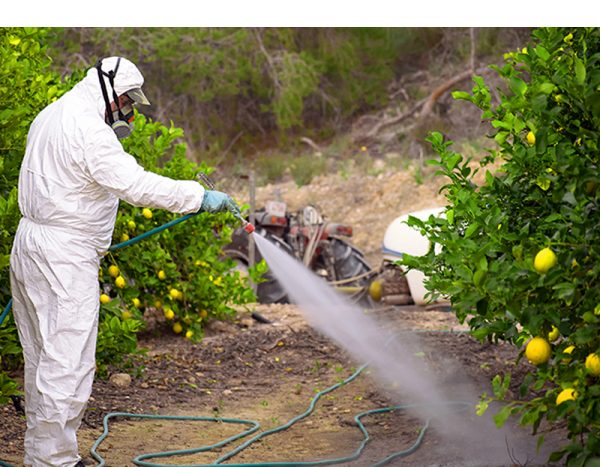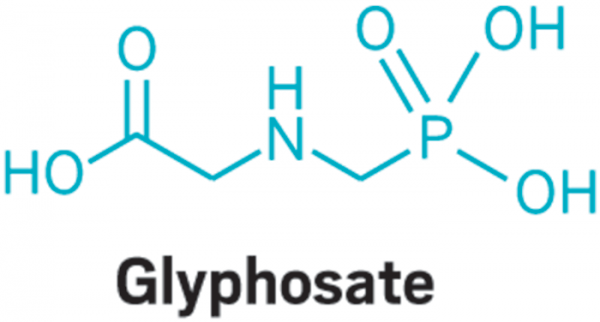Pesticides and Herbicides

Over the years, pesticides and herbicides have been heavily implicated in causing Parkinson’s. Researchers have found high levels of pesticides/herbicides in the brains ofpeople with Parkinson’s, compared to those with regular dopamine levels. Furthermore, agricultural workers who find themselves exposed to these pesticides have significantly higher rates of PD than the general public meaning that farmers are one of the occupations of most risk to developing Parkinson’s. It is not just high levels of pesticide exposure that puts people at risk. Recent research suggesting that even low levels of exposure to pesticidesdisrupts cells in a way that mimics the effects of mutations known to cause Parkinson’s disease.
The most toxic pesticides within agriculture that have been directly linked to causing Parkinson’s are Parquat and Maneb, which can be found in the popular Roundup weed killer products. Although these pesticides are now banned from use in the UK, it is possible that you are consuming traces of these through food that has been imported from around the world. Now, you may think that small traces of this toxic substance will not do any harm, but we have to remember that paraquat in particular is extremely toxic- enough so to lead to death if ingested. It destroys body cells and could still change cell structure over time.Therefore, in order to reduce the risks of developing Parkinson’s, we need to adopt a lifestyle that actively protects brain health and our nervous system and take necessary precaution. We need to be more proactive about our health. Fruit and vegetable are important categories of human diet and they are also paraquat carriers, because paraquat can enter into plant cell quickly, simple washing may not remove it.
Over the years, pesticides and herbicides have been heavily implicated in causing Parkinson’s. Researchers have found high levels of pesticides/herbicides in the brains ofpeople with Parkinson’s, compared to those with regular dopamine levels. Furthermore, agricultural workers who find themselves exposed to these pesticides have significantly higher rates of PD than the general public meaning that farmers are one of the occupations of most risk to developing Parkinson’s. It is not just high levels of pesticide exposure that puts people at risk. Recent research suggesting that even low levels of exposure to pesticidesdisrupts cells in a way that mimics the effects of mutations known to cause Parkinson’s disease.
The most toxic pesticides within agriculture that have been directly linked to causing Parkinson’s are Parquat and Maneb, which can be found in the popular Roundup weed killer products. Although these pesticides are now banned from use in the UK, it is possible that you are consuming traces of these through food that has been imported from around the world. Now, you may think that small traces of this toxic substance will not do any harm, but we have to remember that paraquat in particular is extremely toxic- enough so to lead to death if ingested. It destroys body cells and could still change cell structure over time.Therefore, in order to reduce the risks of developing Parkinson’s, we need to adopt a lifestyle that actively protects brain health and our nervous system and take necessary precaution. We need to be more proactive about our health. Fruit and vegetable are important categories of human diet and they are also paraquat carriers, because paraquat can enter into plant cell quickly, simple washing may not remove it.

Glyphosate
Glyphosate, commonly known by its original trade name Roundup (manufactured by Monsanto), is the world’s most widely used herbicide (weedkiller). Glyphosate-based herbicides are manufactured by many companies in many countries.
Glyphosate is used on many crops to control weeds, including about 80% of genetically modified (GM) crops. Seeds are modified to be resistant to glyphosate so that when the herbicide is used it kills only the weeds around the crops. It is also sprayed on many crops, including cereals, such as wheat and oats, as a pre-harvest desiccant. This encourages the crops to dry quickly and evenly, allowing for earlier harvesting.
In addition, it is used by landowners, such as councils, to control weeds in our towns and cities. It is used in our parks, playgrounds, schools and on our pavements and verges. It is also readily available in many supermarkets and garden centres as an easy tool for gardeners at home and on allotments.
Studies have found that glyphosate-based herbicides can interfere with various organs and biochemical pathways in mammals. Genotoxicity and endocrine disruption also lead to chronic health and developmental effects. It causes imbalances in gut bacteria and some studies have found that glyphosate appears to accumulate in human cells. A 2018 rat study conducted by the Ramazzini Institute reported that low-dose exposures to Roundup at levels considered safe significantly altered the gut microbiota in some of the rat pups. Another 2018 study reported that higher levels of glyphosate administered to mice disrupted the gut microbiota and caused anxiety and depression-like behaviours. All of these studies have extremely important findings as they show how glyphosate has the ability to adversely affect the gut’s microbiome and mental health.
As mentioned in many areas of the website, toxic build ups within the body also affects gut microbiome and mental health and complaints relating the gut e.g constipation and digestion issues as well as mental health problems such as anxiety or depression are common in people with Parkinson’s even before a Parkinson’s diagnosis has been given. Preventative measures such as ceasing to consume foods produced with this pesticide is a great protective measure to protect our gut and brain health. In addition, avoiding conventional insect and weed killers in and around your home will reduce your exposure.
In the UK, pesticide residues are found in approximately 60% of the non-organic fruit and vegetables that are available to consumers. Many of these contain the residues of more than one pesticide so in effect they offer a cocktail of residues with each bite. On the other hand,there is almost never a detectable pesticide residue present on organic produce. On the rare occasion that a residue is detected on organic food, it is usually as a result of cross-contamination from non-organic agriculture, or as a result of pesticide persistence in the environment.
It is a fact that consuming organic produce is an effective way to reduce your dietary exposure to pesticides. Since rinsing conventional produce does not wash away all pesticide residue, eating an organic diet is the best way to reduce your exposure to pesticides.




